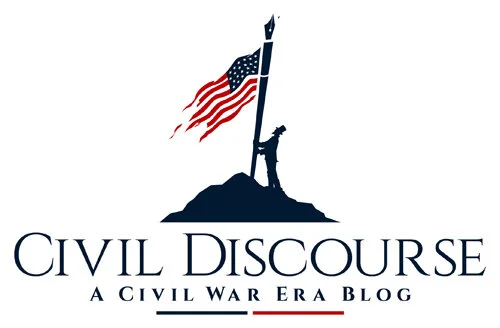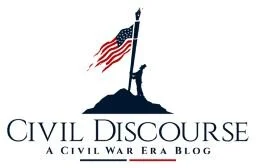
The Blog
At its core, Civil Discourse offers fresh and thought-provoking content via our blog, which delves into one of the richest and most significant eras in American history: the 19th-century.
Examining the era via a range of perspectives and lenses (political, cultural, social, gender, and military, among others), Civil Discourse invites you to read our thoughts and share your own.

About Us
While we at Civil Discourse strive to present a wide variety of topics and viewpoints, our content is ultimately a product of our own experiences. Learn more about Civil Discourse by checking out our mission statement and authors' bios.
Find US ON SOCIAL MEDIA!
Facebook: facebook.com/civildiscourseblog
Instagram: civildiscourseblog
Twitter: CD_HistoryBlog

Featured Blog Post
We periodically highlight content that has us thinking, arguing, reflecting, and learning.
Zac Cowsert examines the challenges faced by everyday United States soldiers in their attempts to quash Confederate guerrilla activity in western Arkansas.
“Chasing Bushwhackers: The 3rd Missouri Cavalry and a ‘Scout to Hot Spring County,’ Arkansas”
On Friday, December 4, 1863, Missouri Corporal John Winterbottom scribbled in his diary that just days before, “20 Rebels attacked the house of a rich unionist 10 miles West of here, by the name of McGuire. He killed two of the Rebels and then made his escape with a slight wound. The Rebels then burned his house, which was the finest in the country.”
The plight of Edwin McGuire and his family owed itself to the confused communal politics and military landscape of Independence County, Arkansas during the American Civil War…
As we slide into 2023, Katie and I usually like to offer a review of our popular posts from the year prior. Unfortunately, 2022 proved to be a very quiet year for our Civil Discourse endeavors! We’re hoping to offer more content in 2023…
On February 8, 1864, blue-clad troopers of the 3rd Missouri Cavalry rode southwest out of Little Rock, Arkansas on a “scout to Hot Spring County…for the purpose,” explained Private Alexander W.M. Petty, “of driving out a company of bushwhackers reported to be committing all kinds of depredations there upon the persons and property of the loyal citizens.” Over the next week, the Federals journeyed over 200 miles, clashed repeatedly with Rebel guerrillas, suffered casualties, and took enemy prisoners. Their scout through Central Arkansas offers a window in the harsh realities of guerrilla warfare and the difficulties that faced U.S. soldiers in attempting to suppress it.
Despite a slow year here at Civil Discourse, we’d nevertheless like to share our top three posts of 2021!
Lieutenant Colonel Walter Taylor served as General Robert E. Lee’s aide-de-camp throughout the Civil War. In the context of the critical 1864 Overland Campaign, Taylor’s writings offer an invaluable window into morale and thoughts of the Confederate high command throughout the summer. They likewise reveal Confederates’ ultimate faith in Robert E. Lee and disdain for Ulysses S. Grant.
The Augusta Powder Works operated until April 1865 when the Confederacy surrendered and the Civil War ended. During operation the works manufactured about 7,000 pounds of gunpowder a day for a total of 2,750,000 pounds produced during the war. The Confederate Powder Works was the only permanent, industrial complex constructed by the Confederate States of America.
In late May 1862, United States soldiers of the 44th Ohio Infantry occupied the abandoned offices of the Greenbrier Weekly Era in Lewisburg, western Virginia. Having recently emerged victorious in the Battle of Lewisburg and perhaps faced with the boredom of occupation, the soldiers set about publishing a newspaper they christened the Yankee. Though the Federals only managed to print a single issue before evacuating the town, the Yankee’s four pages reveal the hardening attitudes of Federal soldiers and the arrival of “hard war” in 1862 western Virginia.
Following Lee’s retreat from Antietam proved deadly for the Union 5th Corps at the Battle of Shepherdstown. One of West Virginia’s largest Civil War battles, it was largely inconsequential in terms of stalling Lee’s retreat. However, it was an unforgettable event for the men who fought it.











In May 1861, a “Western Arkansian” penned a passionate defense of Arkansas Unionism: “The people of western Arkansas, the true people, the bone and sinew of our land, are yet, in sentiment and at heart, for the preservation of our once glorious union.” By exploring the circumstances of Arkansas’s secession, we can better understand the anger of this unknown Unionist and the riven reality of Arkansas’s entry into the Confederacy.